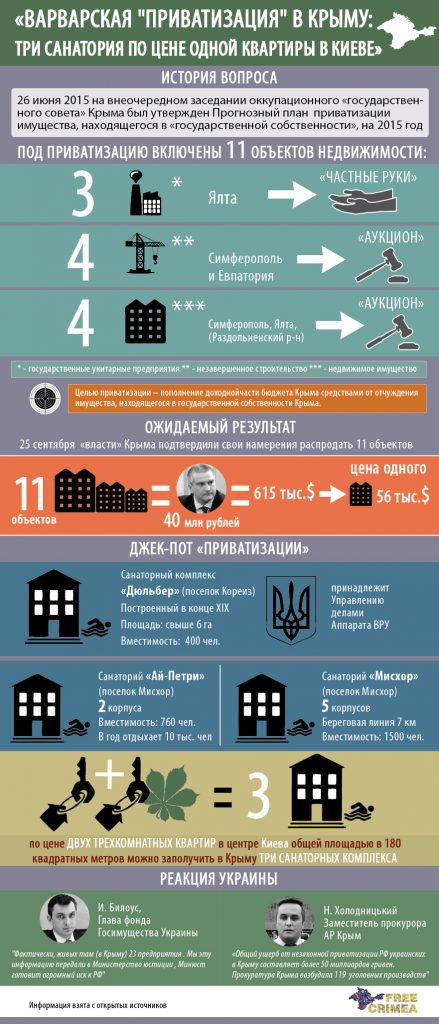Kyiv, October 1, 2015. A number of objects in Crimea which belonged to Ukraine before the annexation of the peninsula will be put on sale in the near future. On June 26, the so-called Crimean State Council approved the Forecast Plan of privatizing state-owned property for 2015. “Eleven properties are subject to privatization. Three of them are large industrial enterprises in Yalta, four are unfinished constructions in Simferopol and Yalta, and four are properties located in Simferopol and Yalta, in Rozdolnensky district,” said Taras Berezovets, Free Crimea Project leader, during a discussion, organized in partnership with Free Crimea, at Ukraine Crisis Media Center. According to him, self-proclaimed Crimean authorities made their first claims to Ukrainian state-owned property, such as Chornomornaftogas, Massandra and the Artek children’s camp, in March 2014. General estimates show that, since the occupation of Crimea, more than 4,000 large and small businesses have been subjected to raiding. Most of them are hotels and restaurant businesses.
“The main goal of privatization is replenishing budget revenues from sale and disposal of property located in the annexed peninsula,” said Berezovets. Occupation authorities, therefore, expect to receive 40 mln rubles ($615,000). The average cost of each entity is $56,000. These are huge sanatoriums, like Ai Petri, Dulber in Koreiz settlement, the area of which is over 6,000 hectares, and Miskhor, which owns 7 km of coastline. “It is, in fact, a ‘golden’ land,” said Berezovets.
“I think it’s just an attempt to legalize property. They set low prices so that the next owner is a nominally legitimate one,” said Taras Zagorodniy, economist, Managing Partner of the National Anti-Crisis Group. Besides, he added, it is for the so-called head of the Republic of Crimea Sergei Aksenov’s benefit to get the money, even a lesser amount. According to the expert, the Crimean authorities set low prices as decreased number of tourists and sanctions-associated risks make Crimea unattractive to investors. Sanction limitations may be circumvented by buying property through offshore companies. But then the investor will have to agree to transaction costs and take into account a “corruption tax”. Thus, the de facto offered price is only a portion of the amount that the investor will have to pay. Another problem will be to find willing buyers. “The announced prices mean we are talking more about distribution, or gifts, rather than privatization,” stated MP from the Batkivshchyna Union Ihor Lutsenko.
The Ukrainian government announced that as a result of the forfeiture of property in Crimea, the state has suffered losses of more than 50 bln. UAH and it will bring a lawsuit against Russia to international courts. At the same time, in the experts’ opinion, it is actually a much bigger loss. “According to various estimates, there should be a minimum figure of 100 billion. According to the Defense Ministry, the loss of military equipment alone amounts to 20 billion,” said Taras Zagorodniy. Yevhenia Andrijuk, of NGO “Krym.SOS”, an expert in international and humanitarian law, noted that in this case Ukraine has all chances to win the lawsuit. “Humanitarian law is applicable in Crimea because it is an occupied territory. The situation with Donbas is not clear, whereas it is obvious with Crimea. It is an international conflict in which there are two parties, even if the occupation is not accompanied by armed resistance.” She stressed that under the rules of humanitarian law, an occupying power has the right to only use the property and after the conflict resolution not only to return the property to the opposite party, but also to compensate it for all losses. Thus an intention to privatize the property confiscated from Ukraine is absolutely illegal. At the same time, the expert added, Russia is most likely to refuse to execute any court decision. Taras Zagorodniy noted in this connection that the preparation of lawsuits by Ukraine has slowed down primarily due to the fact that the filing of claims may bring attention to the numerous shady schemes that have emerged over the last year. “Everything is slow because, unfortunately, more businessmen than politicians stay in power,” said the expert. “In fact, this area is used as a black hole for re-exporting Ukrainian goods to Russia.” Ihor Lutsenko said that according to Vox.ua estimates, during the last month before the blockade 32 trucks of net outflow passed through Crimea in a single day, while exports to Russia through the uncontrolled territories as a whole, in Mr. Zagorodniy’s opinion, can reach $ 1 -2 billion.
According to experts, it is important that the Ukrainian authorities take a tougher stance on Crimea, put an end to shady trade through the occupied territory and resort to economic pressure. “What is happening [public blockade of the peninsula – Ed.] is nonsense, because the state must deal with these Crimea issues […] rather than the public, said Ihor Lutsenko. – The less we have non-transparent relations with the aggressor, the greater our ability to defend ourselves […]. We need a systematic policy which should be developed by a relevant institution, such as the National Security and Defence Council.”





